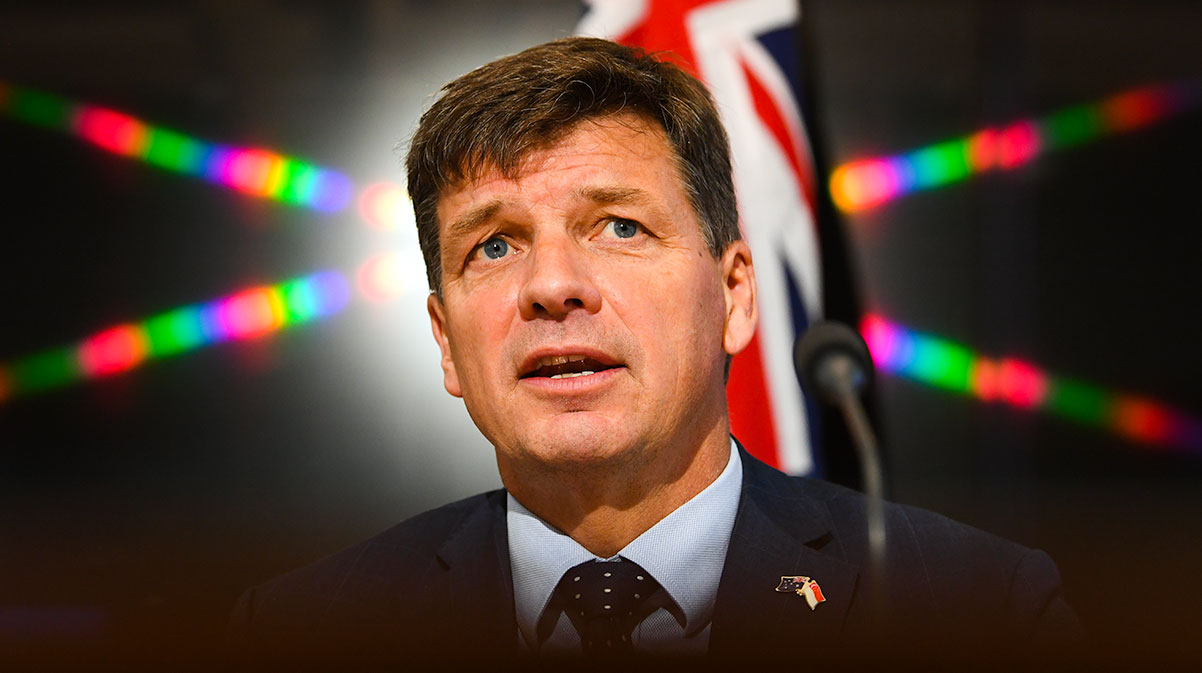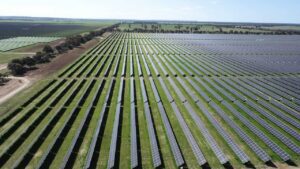Billions in government grants set aside to support the development of renewable energy technologies could be redirected to fossil hydrogen production, carbon capture and storage projects and possibly nuclear energy under new regulations issued by federal energy minister Angus Taylor.
Officials from the Department of Industry, Science, Energy and Resources (DISER) told a senate estimates hearing on Monday that there would be “no prohibitions” on which technologies the Australian Renewable Energy Agency (ARENA) may fund under the new regulations
But in the process of issuing the regulations, it appears Taylor has created a regulatory omnishambles, with officials providing senate estimates contradictory information regarding which technologies the renewables agency may be able to fund.
On Monday last week, an earlier iteration of controversial regulations issued to ARENA – that sought to redirect its funding to non-renewable energy technologies were cancelled out by the federal senate.
The cancellation occurred after a senate oversight committee deemed the regulations to be unlawful, and inconsistent with ARENA’s legislated aims to only fund renewable energy technologies.
However, before the end of the week, federal energy minister Angus Taylor had issued a replacement set of regulations that again sought to have ARENA’s funding redirected to the government’s preferred technologies, including carbon capture and storage and fossil hydrogen production.
The new regulations tie the types of technologies that ARENA may fund to a definition of “clean energy technologies” included within legislation establishing a separate agency, the Clean Energy Finance Corporation.
The regulations create an unusual situation where one body, the board of the Clean Energy Finance Corporation, is able to define which “low emissions technologies” ARENA will be able to fund.
An explanatory statement included with the latest set of regulations stated that the Morrison government intends to ensure ARENA could fund non-renewable energy technologies.
“The Regulations provides ARENA with the necessary authority to deliver any non-renewable elements of the programs, supporting emissions reductions through broader clean energy technologies such as energy efficiency and non‑renewable low-emission technologies,” the explanatory statement said.
The Clean Energy Finance Corporation is, however, explicitly prohibited from investing in nuclear projects and carbon capture and storage projects under its legislation.
Representatives from the CEFC told the senate estimates hearing on Monday that it would not be possible for the green bank’s board to include carbon capture and storage projects within its definition of “low emissions technology”, due to the explicit prohibition contained within the CEFC’s legislation.
But, confusingly, officials from both the industry department and ARENA insisted that the prohibitions imposed on the CEFC would not apply to ARENA.
“For those purposes, for regulation, the clean energy technologies, [includes] technologies that make up the form of renewable energy technologies, energy efficiency technologies, and also low emissions technologies,” the head of the department’s international climate and technology division, Kushla Munro, told the hearing.
“The previous regulations were only for on road energy efficiency, so [the new regulations] would extend into areas such as air, sea and air transport and low emissions cement.”
“The previous regulations were limited to steel and aluminium, and in that context, the capture of carbon is an essential technology,” Munro added.
“So there are no prohibitions.”
Industry department officials detail the technologies the Australian Renewable Energy Agency may now be used to fund, under new regulations issued by Angus Taylor on Friday.
Includes "blue hydrogen", carbon capture and storage and other non-renewables.https://t.co/o8U1nAyzz2 pic.twitter.com/2rPXQhHil0— Michael Mazengarb (@MichaelM_ACT) April 3, 2022
It suggests the Morrison Government has attempted to create a seemingly perverse situation where, either the Clean Energy Finance Corporation will need to direct ARENA to fund technologies that it itself is prohibited from investing in, or the CEFC is, in fact, prohibited from directing ARENA to fund in the technologies the Morrison Government wants it to support.
ARENA CEO Darren Miller told senate estimates that he understood that the purpose of the new regulations was to fulfil the Morrison government’s clear intention to fund non-renewable technologies.
Miller said that he expected that ARENA would now be able to fund carbon capture and storage projects, and possibly nuclear, but noted that a broader prohibition on nuclear projects in Australia would prevent any such projects from proceeding.
Australian Renewable Energy Agency CEO Darren Miller telling senate #estimates that under new regulations, the agency is not prevented from funding CCS and nuclear projects.
Only a broader nuclear moratorium being the main thing preventing investment in that tech. pic.twitter.com/bCdItrts4y— Michael Mazengarb (@MichaelM_ACT) April 4, 2022
There have been some efforts to lift the prohibition on Australian nuclear energy projects, notably by some federal Nationals MPs. Chair of the Climate Change Authority, Grant King, has also indicated that there are behind-the-scenes lobbying efforts trying to convince the federal government to lift the nuclear ban.
CEO of the CEFC, Ian Learmonth, later confirmed to the senate estimates hearing that he expected the CEFC to remain constrained by the prohibitions contained within its establishing legislation, banning the green bank from investing in nuclear and carbon capture and storage projects.
Learmonth confirmed that this ban would continue to prevent the CEFC from investing in “blue” hydrogen projects, given they required a carbon capture and storage component.
CEFC CFO Andrew Powell added that he understood that the CEFC board would not be able to include carbon capture and storage technologies within its definition of “low emissions technologies”, raising clear questions about what technologies ARENA will be able to fund and whether it was exempt from the prohibitions imposed on the CEFC.
CEFC tells #estimates that it can't include CCS in its definition of "low emissions technology" because it is prohibited.
Now there's real questions about what this means for ARENA.
ARENA and industry department officials say the prohibition won't apply to ARENA.
Who is correct? pic.twitter.com/FJI0ZPD3fu— Michael Mazengarb (@MichaelM_ACT) April 4, 2022
The timing of Taylor’s issuance of the new regulations means they will be safe from the scrutiny of the senate, and protected from a further cancellation, until after the forthcoming election, as the senate has effectively adjourned for the term.
A spokesperson for the Department of Industry, Science, Energy and Resources told RenewEconomy that it would ultimately be a decision for the ARENA board what technologies the agency will fund.
“The new regulations prescribe an additional function for ARENA of providing financial assistance in relation to ‘clean energy technologies’ within the definition of the Clean Energy Finance Corporation Act,” the department spokesperson said.
“The ARENA regulations do not incorporate the restriction on ‘prohibited technologies’ under section 62 of the CEFC Act.”
“Whether a particular CCS technology is a low-emission technology will be determined by the ARENA board based on the general principles in the guidelines. Ultimately, the ARENA Board decides what it will fund independently of government, based on the applications it receives from project proponents.”










